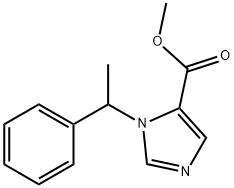Chemical Properties
Colourless Hazy Oil
Uses
Metomidate is a the methyl ester analogue of Etomidate (E933300), with sedative and hypnotic properties. Metomidate is mainly used as an anesthetic for veterinary use on its own or in combination with Azaperone (A802200) and other sedatives.
Definition
ChEBI: Methomidate is a member of imidazoles.
Biological Functions
Metomidate, a methyl analog of the anesthetic agent etomidate, is a potent inhibitor of CYP11B1 (11β-hydroxylase) and CYP11B2 (aldosterone synthase), the final two enzymes involved in cortisol and aldosterone synthesis, respectively.
Mechanism of action
Metomidate reduces plasma cortisol and glucose concentrations and increases fish pigmentation, presumably because of increased production of melanocyte-stimulating hormone on the same primary protein as adrenocorticotropic hormone (ACTH). Imidazole anesthetics (e.g., metomidate and etomidate) interrupt cortisol synthesis in mammals by suppressing the enzyme 11-beta-hydroxylase, which is necessary for cortisol production.
Clinical Use
Metomidate can be 11CH3 labeled and used as a positron emission tomography (PET) radiotracer in combination with high-resolution computed tomography (CT) to detect adrenocortical tumors expressing these enzymes.
